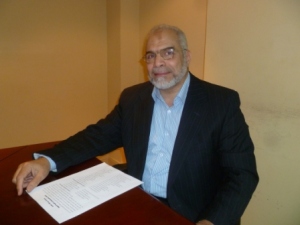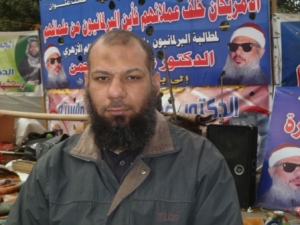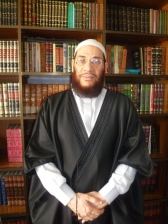In politics, spin is inevitable. But in times of great political struggle spin is often transformed into misrepresentation. In Egypt these days, as seen in the press, the Muslim Brotherhood is spun virtually into a dervish.
Consider first this article from al-Akhbar, ‘Egypt’s Muslim Brotherhood Reassures Washington’, published April 7, 2012. Though it details current Brotherhood efforts to portray itself as a moderate political force, the article opens with a similar effort from 2005.
Muslim Brotherhood Deputy General Guide Khairat al-Shater penned an article in the Guardian following the group’s victory of one-fifth of the parliamentary seats. US President George Bush had been pushing the region towards democracy, but now the West was fearful of the results.
The article carries Shater’s words, saying:
He added that they only ran for 150 seats out of 444 (in the people’s assembly), because they “recognize that the provision of a greater number of candidates will be considered a provocation to the system” and lead it to “falsify the results.”
Here, the picture Shater paints is of the Brotherhood as a keen political player, limiting their rightful ambition for the greater democratic transition. Rather than provoke the autocrat Mubarak, they will do just enough to keep nudging democracy along.
Fair enough. Only it isn’t the truth. Or, sort of. The Brotherhood alluded as such last month.
At the time there were rumors the Brotherhood had ‘cut a deal’ with the regime for partial political representation. The win-win gave a measure of political representation to the Brotherhood, while Mubarak could complain to the West about the results of ‘democracy’ and continue to rule autocratically. If true, it worked. The Bush administration fell silent and dropped its democracy rhetoric.
These days as well the Brotherhood is accused of ‘cutting a deal’ with the military council.
Therefore it is very interesting to consider the new spin the Brotherhood gives to the 2005 elections. Egypt Independent carried the news of their ‘confession’, on June 13, 2012.
According to ‘an official statement’, the Brotherhood:
Confessed to meeting with the State Security Investigations Service (SSIS) in 2005, saying in an official statement on Wednesday that it attended the meeting “in order to avoid a string of arrests that would have affected hundreds of Brotherhood members.”
The Brotherhood said the SSIS had summoned a number of the group’s members to its headquarters after it nominated 160 candidates for the 2005 parliamentary elections.
In its statement, the Brotherhood said that during the meeting, SSIS leaders asked them to withdraw a large number of candidates and to only compete for thirty seats in Parliament. However, according to the statement, the Brotherhood heads refused the request.
“We said, ‘Let the people elect 40, or more or less. This is their right. We do not expect all 160 candidates to win and no one will withdraw.’” The statement went on to say that the group was threatened, but that they were not intimidated by the threats.
There is plausibility to this story, but it is a different tale than was given by Shater at the time. No longer is the Brotherhood the self-limiting democratic champion, but rather a political player negotiating with the regime for what it can get. There may well be spin in this presentation as well, as it fits with the post-revolution acceptability of exposing Mubarak’s ills. The Brotherhood, in this presentation, is a victim – though not powerless. They stood up to authority to the level possible.
It is noteworthy, though, to notice numbers. The Brotherhood confessed to seeking 40 representatives in this ‘deal’, however coerced it was. Somehow, they wound up winning 88.
In light of similar Brotherhood post-revolutionary promises to ‘limit’ their political representation, it is curious to watch the pattern repeat itself. To what extent in both 2005 and 2011 was the Brotherhood pressed to limit their ambition, and how in either case did they exceed the deal/expectation?
Perhaps they simply play the political game better than anyone else.
This fact becomes clear when examining the spin that is marshaled against them. The Egypt Independent ended its article:
The statement came after repeated accusations from presidential candidate Ahmed Shafiq that the Brotherhood used to meet with and have friendly relations with the Mubarak regime.
Here, the writer does a good job of not endorsing the accusation, putting it in context, but also leaving the impression in the reader’s mind. It is a slight use of spin, but it is there.
Far less subtle is this example from Aswat Masr, published July 19, 2012. The headline reads, ‘The General Guide Commenting on the Death of Omar Suleiman: God, Save us from the Helpers of the Deposed [Regime]’.
Closer examination of the article, however, shows the Brotherhood statement has no direct relation to Suleiman whatsoever.
An indirect relation is possible. July 19 is the day Suleiman died. He was widely reviled for his alleged roles in torturing prisoners, and especially in his efforts to curtail the Muslim Brotherhood and other Islamists.
During the revolution Mubarak appointed Suleiman as vice-president, but only a few days later he fell with the regime. When Suleiman briefly resuscitated his political career in a failed attempt to run for president, he fit well into the secular-Islamic dichotomy and was hailed by some as a hero. Upon his death he was given a military funeral.
While some Islamists have praised his death, the Brotherhood has been more cautious. President Morsy permitted the military funeral, but kept his distance and did not attend. It is judicious for them to keep their silence and not gloat over the fall of their long time enemy.
In this light the headline of Aswat Masr is better understood. It paints the Brotherhood as celebrating Suleiman’s death, and wishing similarly for salvation from those still alive.
Perhaps the writer has divined the Brotherhood’s intentions, but he has not accurately conveyed their words. The article takes from a written, weekly statement issued by the General Guide, Mohamed Badie. The text opens with Ramadan and praise of the Qur’an.
Only later on does the headline quotation occur, and Suleiman is never mentioned. Instead, Badie asks God:
Save us from tyrants, the corrupt, and the helpers of the dead, deposed regime. Aid our president in leading the ship of the nation to safe shores.
This statement can very much be read into the current political struggle between the Brotherhood and the military/old regime. The headline, however, makes the reader think it is an attack on Suleiman, painting the group as a vindictive entity worthy of Suleiman’s attempts at suppression.
When spin is present, it is best to find truth, however difficult.
According to my best and current understanding, the Muslim Brotherhood and the old regime danced together, awkwardly. There were periods of oppression and jailing, and periods of limited freedom of operation. On the whole, the group was free to function socially, but restricted politically. The regime always had the upper hand, but the Brotherhood knew how to exploit its limitations and slowly develop its legitimacy.
Omar Suleiman was a loyal employee, tasked with protecting the state from violent Islamists, and protecting the regime from political challenges. I suspect the tales of oppression are true.
What is still unclear, due the presence of spin from all sides, is if the Muslim Brotherhood is a legitimate democratic governing party. There is a great political struggle underway, and nearly all focus rests on this question.
The Brotherhood is spun, but also spins itself. Perhaps soon the dust will clear.
Even a dervish eventually stops.
Related Posts:
- Brotherhood Faces Both Ways as Egypt Votes for President – May 24, 2012
- Does God Permit a Muslim to Break a Promise? – May 7, 2012
- Coloring Theology – March 2, 2010


